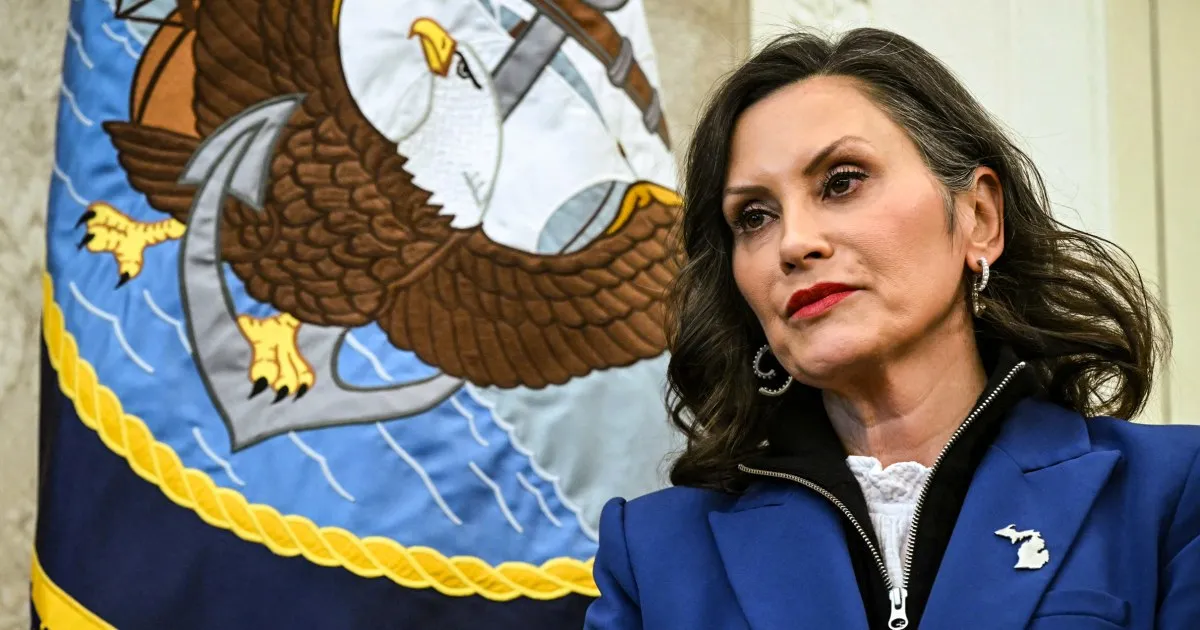
Since becoming the governor of Michigan, Gretchen Whitmer captured public attention with her bold promise to “fix the damn roads.” As she positions herself for a potential presidential bid in 2028, her ability to navigate early political challenges will be crucial. Recently, during a visit to Washington, D.C., Whitmer faced criticisms that could shape her future as a candidate.
On Wednesday, Whitmer delivered a policy speech calling for a “consistent national strategy.” In a surprising move, she found common ground with former President Donald Trump on tariffs, despite her criticism of his erratic tariff strategies. While she did not outright oppose tariffs, she expressed an understanding of Trump's motivations for their implementation. This stance drew sharp rebuke from fellow Democrats, including Colorado Governor Jared Polis, who stated, “Tariffs are bad outright because they lead to higher prices and destroy American manufacturing.”
Later that day, Whitmer joined Trump in the Oval Office, where she was ostensibly there to discuss Michigan issues. However, the meeting took an unexpected turn as she stood by while Trump signed several controversial executive orders, including probes targeting officials from his previous administration. The optics of this meeting, particularly Whitmer's uncomfortable positioning during Trump's press conference, raised eyebrows among her allies.
Whitmer's presence at the Oval Office event led to a flurry of criticism from within her party. A Democratic operative lamented, “It feels like it removes some of the momentum she had as a politically savvy swing-state Dem.” In response to the backlash, Whitmer's team quickly clarified that her presence was not an endorsement of Trump's actions. A spokesperson stated, “The governor was surprised that she was brought into the Oval Office during President Trump’s press conference without any notice of the subject matter.”
Despite the challenges, many Democrats view Whitmer as a formidable figure in the party. As a two-term governor of a battleground state with a strong reelection victory under her belt, she is considered a potential contender for the presidency in 2028. Unlike some of her peers, Whitmer seeks to maintain a working relationship with Trump, recognizing that he won her state in the previous election cycle. Her approach reflects her positioning as a center-left moderate appealing to a Midwestern electorate.
During her speech in Washington, Whitmer called for reducing red tape and increasing domestic production. She highlighted the need for more American manufacturing, stating, “Let’s usher in, as President Trump says, a ‘Golden Age’ of American manufacturing.” While she agreed with Trump on the importance of domestic production, she diverged from him on the specific tariff policies he had recently proposed.
Whitmer's stance on tariffs has put her at odds with other Democratic leaders who strongly oppose Trump's measures. In a question-and-answer session, she empathized with constituents who do not want Democratic officials collaborating with Trump. However, she emphasized her commitment to working across party lines to deliver results for Michigan.
Whitmer’s visit to the Oval Office not only elicited mixed reactions from Democrats but also from Republicans, who felt it bolstered a leader they have long criticized. A Republican strategist remarked, “Trump literally just f---ed Republicans in Michigan by saying Whitmer is doing an excellent job.” The evolving relationship between Whitmer and Trump, particularly given their shared history, adds a layer of complexity to her political trajectory.
As Whitmer navigates the intricacies of her governorship and potential presidential ambitions, her recent experiences underscore the balancing act she must perform. While her visit to discuss critical Michigan issues may yield tangible results, the political optics surrounding her collaboration with Trump will undoubtedly shape her narrative moving forward. As she continues to advocate for Michigan, the broader implications of her actions on the national stage remain to be seen.